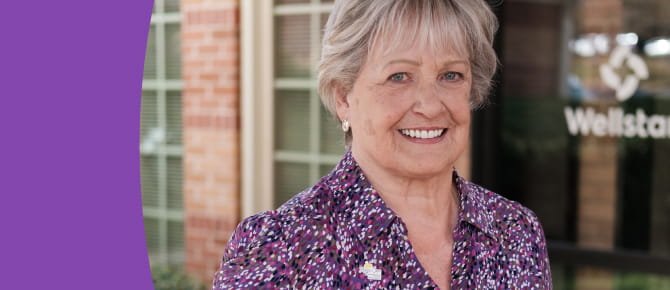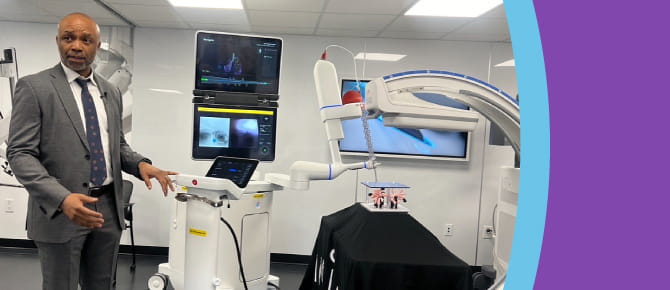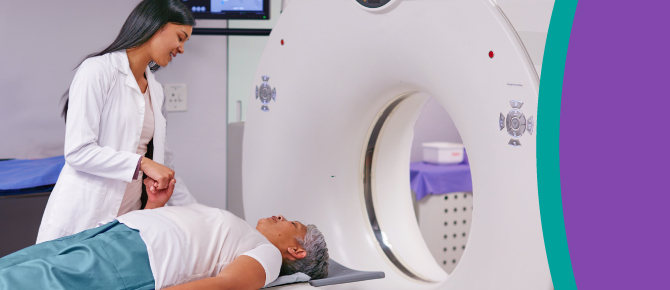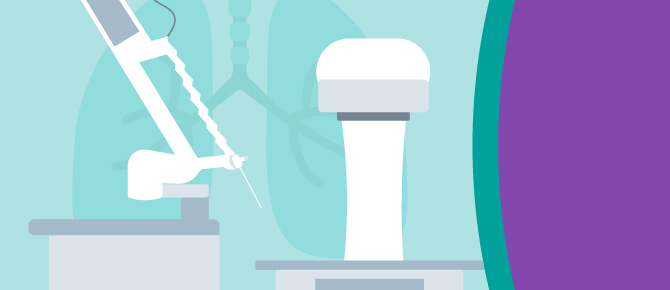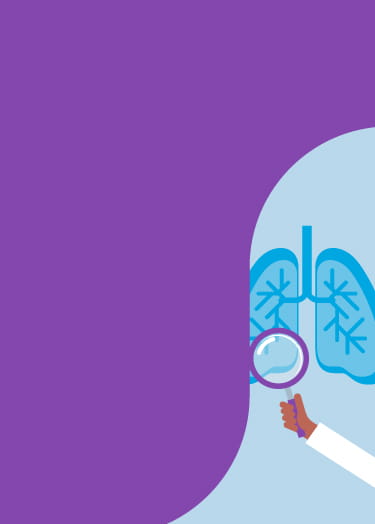
Lung Cancer Screening
Lung Cancer Screening Saves Lives
Wellstar’s lung cancer screening program is a national leader in early detection. Our low-dose CT scans help detect early-stage lung cancer before clinical signs or symptoms become evident. Early-stage cancers can be more easily treated and more frequently cured than later-stage cancers.
Our lung cancer screening program is one of the nation's largest and highest quality lung screening programs, allowing us to detect cancer earlier and customize the best treatment plan for each patient. We are proud to be designated as a Screening Center of Excellence and Care Continuum Center of Excellence by the GO2 Foundation as well as a designated Lung Cancer Screening Center by the American College of Radiology (ACR). These accolades highlight our commitment to providing accurate and safe diagnostic care for our patients.
Low-dose CT lung cancer screening
Research shows that screening using a low-dose CT scan with low levels of radiation exposure can help detect lung cancer earlier, before clinical signs or symptoms become evident. Most people with early-stage lung cancer do not have any symptoms, but early-stage cancers can be more easily treated and more frequently cured than later-stage cancers. This is why screening is so important.
Screening for lung cancer is not a one-time test, but a process that involves a periodic evaluation of your lungs over time to look for newly emerging cancer. The capability of CT scanners to detect tiny lung nodules and to compare the nodules for changes in size over time is critical to the screening process. People who are at high risk for lung cancer have access to these low-dose CT scans and it is recommended they have them once a year. Depending on the findings, some patients may have more or less exams.
Click on the tabs to the left to learn more about the benefits and risks of lung cancer screening, whether insurance covers it, how to get help to quit smoking and more.
- Should I Be Screened?
- Insurance Coverage
- Risks & Benefits
- Interpreting Your Results
- Support to Quit Smoking
Should I Be Screened for Lung Cancer?
Screening is recommended for people who are most likely to develop lung cancer. There are pros and cons to screening, so speak with your doctor about starting a screening program.
Although the United States Preventative Services Task Force has recommended changes to the current screening eligibility, most insurance companies are not yet covering these services. If you think you qualify under the new guidelines, contact your insurance company for coverage details.
The following groups are currently considered eligible for screening by most health plans:
- A person who is age 50 to 80 with a 20 pack-year* smoking history who is either a current smoker or has quit within the past 15 years
- A person who is age 50 and over with a 20 pack-year* smoking history and one of the following risk factors:
- Close blood relative with lung cancer
- History of pulmonary fibrosis or Chronic Obstructive Pulmonary Disorder (COPD)
- History of cancer (excluding non-melanoma of the skin)
- Exposure to cancer causing agents such as, but not limited to:
- Radon
- Arsenic
- Beryllium
- Cadmium
- Chromium
- Nickel
- Asbestos
- Coal smoke
- Soot
- Silica
- Diesel fumes
- Agent Orange
*A pack-year is the number of packs smoked per day multiplied by the number of years smoked. For example: 1.5 packs a day x 20 years = 30 pack-years.
If you do not fall within these recommendations for screening, you may still be at high risk for developing lung cancer. You should discuss your risk factors with your healthcare provider to decide whether screening would be reasonable for you.
Nonsmokers & lung cancer
Smoking is the leading cause of lung cancer; however, it is not the only cause. Statistics show one in five women and one in ten men diagnosed with lung cancer never smoked. The longer someone has stopped smoking, the lower the risk of lung cancer. However, smoking does permanent damage to the lungs, so the increased risk of lung cancer does not totally resolve. In addition, exposure to other people who are smoking (second-hand exposure) is also a risk factor.
The United States Preventive Services Task Force recommends screenings stop once a person has not smoked for 15 years or develops a health problem that limits life expectancy or the ability to have curative lung surgery. (You must be in general good health and willing to undergo a tissue biopsy and treatment if lung cancer is suspected.)
How to prepare for lung cancer screening
There is no special preparation for this exam. You may eat and drink prior to your test. The test is quick, painless and does not involve any intravenous injections.
How to schedule a lung screening
An order from your physician is required for a lung cancer screening. Please contact your primary care physician or a pulmonologist (lung specialist) to make an appointment and discuss the risks and benefits of screening.
Once an order has been obtained from your physician, please call (470) 793-4AIR (4247) to schedule your screening.
Insurance Coverage for Lung Cancer Screening
For screening to be covered by insurance, you must not have any symptoms (such as a changing cough, new shortness of breath, chest pain, fever or unexplained weight loss) and you meet the age and pack-year smoking history requirements. If you have Medicare, a shared decision-making visit with your healthcare provider is required. Medicare also requires that during this visit, your clinician discusses with you:
- The benefits and harms of screening
- The importance of adherence to annual screening
- Your current health and willingness or ability to undergo a tissue biopsy and treatment if cancer is suspected
- The importance of not smoking
Although the United States Preventative Services Task Force has recommended changes to the current screening eligibility, most insurance companies are not yet covering these services. If you think you qualify under the new guidelines, contact your insurance company for coverage details.
Exams not covered by insurance are available through Wellstar’s self-pay program for $225.
How to schedule a lung screening
An order from your physician is required for a lung cancer screening. Please contact your primary care physician or a pulmonologist (lung specialist) to make an appointment and discuss the risks and benefits of screening.
Once an order has been obtained from your physician, please call (470) 793-4AIR (4247) to schedule your screening.
Weighing Risks & Benefits
Like most medical procedures, the benefit from screening must be balanced with its risks and limitations.
Benefits
Lung cancer is the number one cause of cancer-related deaths in America. With more than 155,000 lives lost per year, lung cancer kills more people than breast, colon and prostate cancer combined.
Considering the lifetime probability of developing lung cancer is 1 in 14 people, and the 5-year late-stage survival rate is 1-5%, the risks of screening people through an organized program are generally considered to be minimal compared to the benefits of early detection.
Risks & limitations
False alarms: Sometimes further testing may be required, which ultimately turns out not to be cancer. This is called a “false positive.”
Complications of further testing: Occasionally, more invasive procedures, such as bronchoscopy or biopsy, may be necessary. These procedures have risks and can lead to complications, like a collapsed lung or, rarely, even death.
Radiation: This test uses a low-dose of radiation and will expose you to less than 1.5 millisieverts (mSv). This is much less radiation than a conventional chest CT scan. To put this in perspective, the average person in the U.S. is exposed to approximately 3mSv of natural background radiation every year.
Stress/anxiety: It is normal to feel anxious while waiting for your results. Most patients with findings on their scan that require additional testing are reassured when they learn that most of these turn out to be benign and of no concern. If you experience stress or anxiety over your results, talk with your doctor or the lung screening care coordinator, who can help.
Over-diagnosis: Sometimes screening tests find cancers that are very slow growing and would have never caused problems. When this cancer is found, it is called over-diagnosis. There is a small chance someone may be treated for a cancer of this type, which, had it been left alone, would not have harmed them.
No guarantee early detection will avoid death: This screening cannot detect all lung cancers and cannot guarantee early detection will avoid death from lung cancer. Lung cancer found early increases your chance of cure through early treatment, however, some cancers can recur, even when found early, and spread to other parts of the body (referred to as metastasis). Research continues to show early detection is the best hope for cure.
How to schedule a lung screening
An order from your physician is required for a lung cancer screening. Please contact your primary care physician or a pulmonologist (lung specialist) to make an appointment and discuss the risks and benefits of screening.
Once an order has been obtained from your physician, please call (470) 793-4AIR (4247) to schedule your screening.
How Results are Interpreted & Shared
All lung screenings are initially interpreted by a radiologist (a person with expertise in reading medical images) and findings are then reviewed by a team of physicians who specialize in the diagnosis and treatment of lung cancer. Results are promptly communicated to you and your physician. When lung cancer is suspected, arrangements are made for a prompt evaluation.
Results turnaround
Once the physicians complete their review of your images, your results are posted within 3 to 5 days in your Wellstar MyChart account. Results are mailed to you and your physician within one week.
If a lung cancer is suspected, you will be notified by telephone and immediate arrangements will be made for a physician specializing in lung cancer treatment to meet with you. Your Wellstar physician can help you get access to your MyChart account.
What a lung nodule indicates
Patients whose screening shows a lung nodule may feel concerned. However, you should not be overly concerned if your report indicates you have small lung nodules. Most people who meet eligibility for screening will have some. Nodules are very common—at least 50% of people have them by the time they are 50 years old.
Although a large majority of these nodules are benign (not cancer), they will need to be followed over time and monitored for changes or growth.
How to schedule a lung screening
An order from your physician is required for a lung cancer screening. Please contact your primary care physician or a pulmonologist (lung specialist) to make an appointment and discuss the risks and benefits of screening.
Once an order has been obtained from your physician, please call (470) 793-4AIR (4247) to schedule your screening.
Support to Quit Smoking
Quitting smoking is the single best thing you can do to improve your health. In addition to damaging the lungs, tobacco smoke also injures many other parts of the body such as blood vessels and the heart. As a smoker, your risk of death from heart attack or emphysema continues to increase even if your CT scan does not show lung cancer. Quitting smoking is tough and there is no way to quit effortlessly. The best approach is one that addresses the physical, social and behavioral aspects of smoking.
Online and phone support is available at becomeanex.org—a free, easy and confidential online quit smoking program that helps smokers “re-learn” life without cigarettes. Call 1 (877) 270-STOP (7867) or visit their website. The Georgia Tobacco Quit Line at smokefree.gov also offers support.



